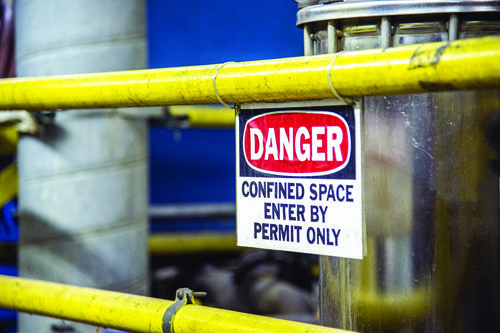COVID-19 and confined spaces
What best practices can employers follow to help prevent the spread of COVID-19 inside confined spaces?

Responding is Ray Chishti, workplace safety editor, J. J. Keller & Associates Inc., Neenah, WI.
The Centers for Disease Control and Prevention recommends workers keep 6 feet apart whenever possible. OSHA advises employers to follow CDC or their state health department’s guidance on social distancing strategies.
Workers inside a confined space can’t always stay 6 feet apart. If this isn’t possible, using 2 or 3 feet of distancing may still be helpful. CDC says the coronavirus can spread through respiratory droplets that become airborne from an infected individual’s mouth or nose when he or she talks, sneezes or coughs. Workers can become infected after contacting contaminated surfaces, including those inside the confined space.
Employers should limit the number of workers allowed inside confined spaces. Workers should use personal protective equipment to reduce their exposure to COVID-19.
Using PPE
Certain PPE may not be readily available to buy because of supply-chain shortages. Workers should use disposable gloves, a mask or face covering, safety glasses, and/or a faceshield to create a barrier between germs and themselves. Depending on the types of exposure hazards that are present, workers may also need to wear coveralls or other types of PPE.
If workers will be using a hazardous chemical, check its Safety Data Sheet for the recommended PPE.
Employers need to educate workers on how to:
- Inspect and use PPE.
- Effectively clean and store it.
- Dispose of it properly.
However, before issuing workers PPE for use in confined spaces, employers should first try to implement other safety controls, including ventilation, work substitution and social distancing. Workers can use PPE and other safety controls together. PPE should be the last line of defense employers use to protect workers from COVID-19.
Use EPA-registered disinfectants
The Environmental Protection Agency recommends that employers disinfect surfaces using chemicals approved by the agency as effective against the coronavirus (SARS-CoV-2) that causes COVID-19. Depending on the types of confined spaces present in the workplace, each employer may have distinct types of housekeeping issues.
EPA doesn’t endorse chemicals. When the agency approves a manufacturer’s EPA registration, it’s saying that the chemical is safe for use when following the manufacturer’s directions. Follow the manufacturer’s recommendations listed on its SDS. To kill the coronavirus effectively, follow the chemical’s prescribed application time.
If a COVID-19 exposure occurs inside a confined space, housekeeping materials and PPE used to clean it must be discarded properly. Make sure any housekeeping chemicals used inside the space will not create a hazardous atmosphere.
Plan work and perform a hazard assessment
It’s possible to safely work inside confined spaces amid the ongoing pandemic. Employers and workers will need to be more cautious about social distancing, using PPE and performing housekeeping inside confined spaces. Employers should consider performing health assessments on workers before they can enter a confined space. These assessments might include taking a worker’s temperature with a contact-free thermometer, asking workers if they have any symptoms and having them take a COVID-19 test.
OSHA recommends that employers perform a thorough assessment of COVID-19 exposure hazards. Implement all of these best practices and plan confined space work carefully to limit worker exposure to COVID-19.
Editor's note: This article represents the independent views of the author and should not be construed as a National Safety Council endorsement.
Post a comment to this article
Safety+Health welcomes comments that promote respectful dialogue. Please stay on topic. Comments that contain personal attacks, profanity or abusive language – or those aggressively promoting products or services – will be removed. We reserve the right to determine which comments violate our comment policy. (Anonymous comments are welcome; merely skip the “name” field in the comment box. An email address is required but will not be included with your comment.)

